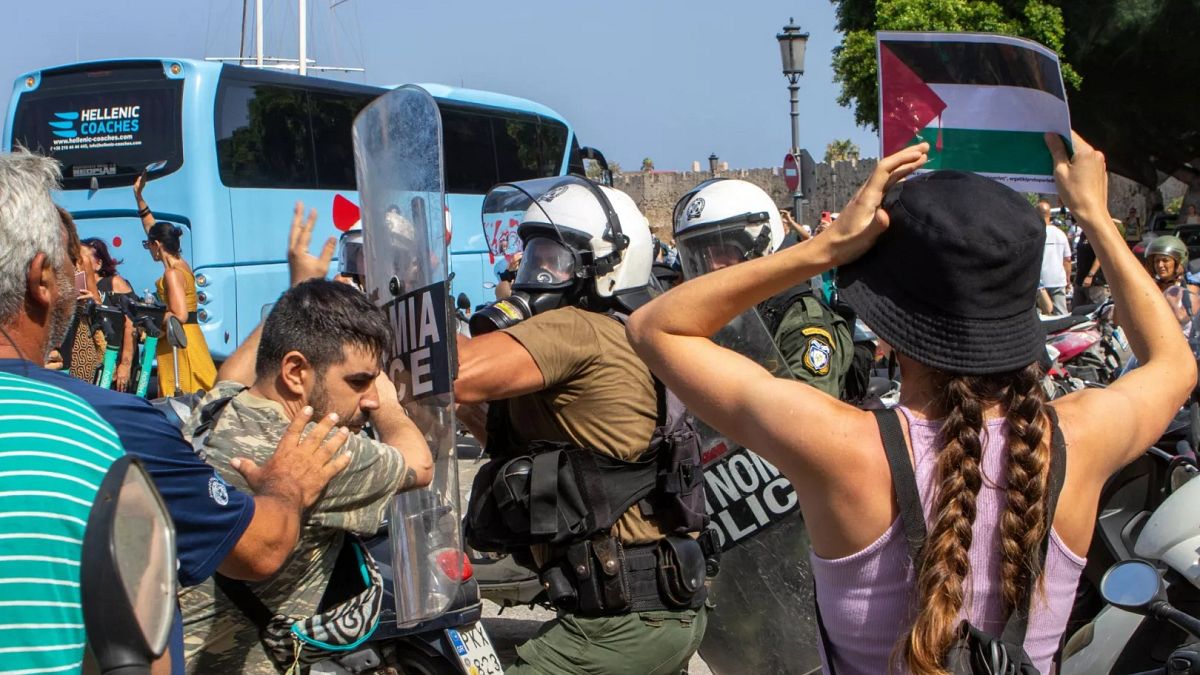

In recent days, various regions across the globe have witnessed significant events characterized by tensions and humanitarian challenges, illustrating the complex nature of current geopolitical landscapes. From the peaceful island of Rhodes to the conflict zones of Gaza, Kashmir, and Kyiv, each situation paints a distinct picture of the interplay between diplomatic movements and local realities.
On the serene island of Rhodes, known for its picturesque landscapes and tranquil Mediterranean atmosphere, demonstrations recently unfolded near a scheduled stop by the Israeli cruise ship, Crown Iris. The ship, carrying over 600 tourists, was met with protests organized by anti-war activists. These demonstrations highlight the broader, ongoing discourse on conflict and peace in the Middle East. The situation saw riot police step in to manage the protests, underscoring the importance of maintaining civil order while respecting the freedom of expression. While such gatherings can sometimes incite tension, they also reflect a society eager to voice its concerns over global issues, seeking a dialog that may, in time, pave the way for greater understanding and resolution.
In addition, deep sorrow enveloped the community of Khan Younis in southern Gaza, where residents mourned the loss of eleven individuals following a recent Israeli airstrike. The attack on a two-storey house brought immense grief to the area, with family and friends participating in a solemn mourning process. As communities come together in support of the victims, the incident is a poignant reminder of the impacts such conflicts have on everyday lives. This tragedy emphasizes the need for ongoing dialogue and efforts toward peace, as cycles of violence continue to affect civilians in profound ways.
Further east, the long-disputed region of Kashmir once again became a focal point of tension. A recent encounter resulted in the death of three suspected militants during a clash with local forces. This region, located at the heart of one of the most fervent territorial disputes between nuclear-armed neighbors, India and Pakistan, remains mired in complexity. Both countries administer parts of Kashmir but claim the territory in its entirety, resulting in frequent eruptions of local and international concern. While incidents like this underline the tense status quo, they also serve as a call to the international community for sustained diplomatic efforts and peace-building initiatives.
In Ukraine, the air still resonates with the echoes of conflict as Russian drone and missile strikes on Kyiv injured at least eight people, including a young child. Despite damage to buildings and vehicles, fortunately, no fires erupted. Ukraine is currently experiencing numerous combat encounters across the front lines, painting a picture of persistence and resilience in the face of adversity. Such events resonate globally, serving as a stark reminder of the ongoing conflicts affecting many around the world. The international community continues to monitor these developments closely, advocating for measures to support peace and stability in the region.
Across these global landscapes, from the Mediterranean to the steppes of Ukraine, the call for peace remains strong and resonant. While the news of these events might seem somber, they also underscore the importance of international dialogue and cooperation, the cornerstone principles that can ultimately foster lasting peace and reconciliation. Each incident, carrying with it the weight of loss and grief, also carries a glimmer of hope for peace through concerted, mindful efforts. As nations navigate these tumultuous waters, the global community stands as a beacon of support, working together towards a more harmonious future.
Source: {link}
